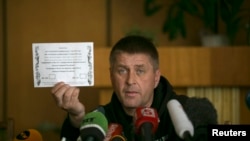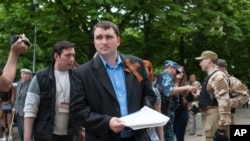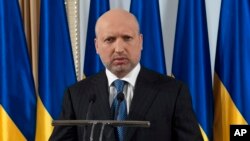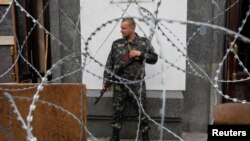The United States says it does not recognize the results of “so-called” referendums held on Sunday in eastern Ukraine, viewing them as "a transparent attempt to create disorder."
White House spokesman Jay Carney offered the assessment at a press briefing on Monday, a day after pro-Russia separatists held votes in Ukraine’s eastern Donetsk and Luhansk regions claiming overwhelming popular support for the regions’ secession from Ukraine.
"We do not recognize the results," Carney said.
He expressed disappointment that Russia not only did not use its leverage to forestall the votes but that Russian media even attempted to legitimize them.
He also expressed concern over apparent efforts to disrupt Ukraine's presidential elections, scheduled for May 25, saying that international efforts should now be centered on allowing Ukraine to hold a free and fair poll.
Carney gave credit to Kyiv authorities for what he said were efforts to address grievances of residents of Ukraine's east through negotiations.
Holding "illegal referendums" and "annexing parts of countries" is not a way forward, he added.
Kyiv and Western governments have been accusing Moscow of orchestrating the current unrest in Ukraine’s east and south.
U.N. Secretary General Ban Ki-moon has called for an end to the undermining of Ukraine's territorial integrity.
“Over the past weeks there has been much violence and little dialogue. I call on all those who have sought to undermine Ukraine’s unity, territorial integrity and stability to immediately cease such actions. The authorities in Kyiv should also continue to respond to such acts with the maximum restraint and within the parameters of Ukrainian law and international human rights principles,” said Ban.
Pleas for Russian troops, annexation
The pro-Russian separatist mayor of Ukraine’s eastern city of Slovyansk said on Monday his region needed Russian troops to provide stability and peace.
Speaking a day after controversial referendums in eastern Ukraine, Vyacheslav Ponomaryov described Ukrainian troops there as occupiers.
“They should go ... We're going to defend our territory,” he said in his sandbagged administrative building in Slovyansk, the most heavily defended rebel city in the east.
Earlier Monday, separatist leaders in Donetsk region appealed to Moscow to consider its absorption into the Russian Federation to “restore historic justice.”
Pro-Russian separatists in Luhansk region followed suit, the Associated Press reported.
Similar moves precipitated Russia's annexation of Ukraine’s Crimea region in March.
The call in Donetsk was made by Denis Pushilin, a leading member of the self-declared “Donetsk People's Republic,” at a news conference in the city..
"Based on the will of the people and on the restoration of a historic justice, we ask the Russian Federation to consider the absorption of the Donetsk People's Republic into the Russian Federation,” he said.
Pushilin said Ukraine, Belarus and Russia - states that formed the core of the now defunct Soviet Union - belonged in a restored historic union.
The results of the Donetsk and Luhansk votes should be implemented peacefully, Russia said earlier, without saying what further action it might take.
Meanwhile, Moscow has called on Ukraine's government on Monday to hold a nationwide debate of the country's future structure in light of the poll results in the country’s east.
Kyiv, EU denounce votes
Ukraine's acting president, Oleksandr Turchynov, has slammed the rebel-held referendums as a "propaganda farce without any legal basis."
However, he added that he wanted to "continue dialogue with those in the east of Ukraine who have no blood on their hands and who are ready to defend their goals in a legitimate way."
The European Union has also condemned the votes as illegal. European Union foreign ministers added two Crimean companies and 13 people to the bloc's sanctions list, EU diplomats said. These are in addition to 48 Russians and Ukrainians who have already been targeted with EU asset freezes and visa bans.
The EU ministers also hinted on Monday that any disruption of elections in Ukraine on May 25 could trigger new economic sanctions against Russia.
But the EU remains far behind the United States in the severity of the sanctions it has imposed on Russia. Some European governments fear tough trade sanctions on Russia could undermine their own economies, just recovering from the financial crisis, and provoke Russian retaliation.
Coup accusations
Turchynov also accused Russia of working to overthrow legitimate state authorities in Ukraine on Monday after pro-Russian rebels declared a resounding victory in referendums in Ukraine’s Donetsk and Luhansk regions.
Turchynov said the Kremlin was trying to disrupt a presidential election scheduled for May 25 which is taking center stage in a confrontation pitting Moscow along with pro-Russia separatists in eastern Ukraine against the government in Kyiv and its Western backers.
Ukraine's May 25 election is intended to secure democratic continuity and legitimacy after pro-Moscow president Viktor Yanukovych fled the country in February, and Western governments have threatened more sanctions in the vital areas of energy, financial services and engineering if Moscow disrupts the vote.
Separatists to form own army
Following Sunday's referendums, separatist leaders in Donetsk say they will form their own army and expect all forces affiliated with Kyiv to leave the region.
Ukraine’s government is already struggling with its anti-separatist military campaign and is reported to be short on men. Analysts say they fear the authorities are likely to rely on irregulars more and that the fighting could spread beyond the regions of Donetsk and Luhansk, which voted Sunday.
Luhansk separatist leader Valery Bolotov said now that the plebiscites are over, his pro-Russian militiamen as well as separatists from Donetsk will start turning their attention elsewhere to help other regions agitate for a break from Ukraine.
He said separatists will not enter into any talks with Kyiv and that the only negotiations currently are about prisoner and hostage exchanges.
TV wars
Russian Foreign Minister Sergei Lavrov urged Western ambassadors on Monday to base the reports they write for their countries about the crisis in Ukraine on what they see on Russian television.
Lavrov accused Ukraine of blocking Russian television broadcasts onto its territory and, echoing charges by Kyiv about Moscow, said the fellow former Soviet republic's media were broadcasting lies about the crisis.
They are trying to set up an information blockade and, with unbiased information closed off to viewers and radio listeners, run completely shameless lies,” Lavrov told a news conference.
“The ambassadors in Moscow obviously see what Russian TV is showing in live broadcasts and I am sure they are obliged to report to their capitals the facts they see live. Otherwise they would be doing a totally unprofessional job,” said Lavrov.
Russian media, most under direct or indirect government control, are widely viewed in the West as distorting news about events in Ukraine both for internal and external consumption.
Moscow turns up pressure on Kyiv
Russian state-controlled gas company Gazprom has reiterated its threat to stop supplying Ukraine with gas if it does not pay in advance for June deliveries, Russian news agencies reported on Monday.
Gazprom CEO Alexei Miller said Gazprom will present Ukraine's state energy company Naftogaz with a bill for June on Tuesday, demanding payment by June 2, the reports said.
He said the amount of gas to be supplied would be zero if no payment is made.
Gazprom says Ukraine owes it $3.51 billion and has warned in recent weeks that it would demand pre-payment for gas from next month.
President Vladimir Putin warned European gas customers last month that deliveries could be disrupted if Gazprom cuts supplies to transit nation Ukraine.
Jamie Dettmer contributed to this story from Donetsk. Some reporting by Reuters.
White House spokesman Jay Carney offered the assessment at a press briefing on Monday, a day after pro-Russia separatists held votes in Ukraine’s eastern Donetsk and Luhansk regions claiming overwhelming popular support for the regions’ secession from Ukraine.
"We do not recognize the results," Carney said.
He expressed disappointment that Russia not only did not use its leverage to forestall the votes but that Russian media even attempted to legitimize them.
He also expressed concern over apparent efforts to disrupt Ukraine's presidential elections, scheduled for May 25, saying that international efforts should now be centered on allowing Ukraine to hold a free and fair poll.
Carney gave credit to Kyiv authorities for what he said were efforts to address grievances of residents of Ukraine's east through negotiations.
Holding "illegal referendums" and "annexing parts of countries" is not a way forward, he added.
Kyiv and Western governments have been accusing Moscow of orchestrating the current unrest in Ukraine’s east and south.
U.N. Secretary General Ban Ki-moon has called for an end to the undermining of Ukraine's territorial integrity.
“Over the past weeks there has been much violence and little dialogue. I call on all those who have sought to undermine Ukraine’s unity, territorial integrity and stability to immediately cease such actions. The authorities in Kyiv should also continue to respond to such acts with the maximum restraint and within the parameters of Ukrainian law and international human rights principles,” said Ban.
Pleas for Russian troops, annexation
The pro-Russian separatist mayor of Ukraine’s eastern city of Slovyansk said on Monday his region needed Russian troops to provide stability and peace.
Speaking a day after controversial referendums in eastern Ukraine, Vyacheslav Ponomaryov described Ukrainian troops there as occupiers.
“They should go ... We're going to defend our territory,” he said in his sandbagged administrative building in Slovyansk, the most heavily defended rebel city in the east.
Earlier Monday, separatist leaders in Donetsk region appealed to Moscow to consider its absorption into the Russian Federation to “restore historic justice.”
Pro-Russian separatists in Luhansk region followed suit, the Associated Press reported.
Similar moves precipitated Russia's annexation of Ukraine’s Crimea region in March.
The call in Donetsk was made by Denis Pushilin, a leading member of the self-declared “Donetsk People's Republic,” at a news conference in the city..
"Based on the will of the people and on the restoration of a historic justice, we ask the Russian Federation to consider the absorption of the Donetsk People's Republic into the Russian Federation,” he said.
Pushilin said Ukraine, Belarus and Russia - states that formed the core of the now defunct Soviet Union - belonged in a restored historic union.
The results of the Donetsk and Luhansk votes should be implemented peacefully, Russia said earlier, without saying what further action it might take.
Meanwhile, Moscow has called on Ukraine's government on Monday to hold a nationwide debate of the country's future structure in light of the poll results in the country’s east.
Kyiv, EU denounce votes
Ukraine's acting president, Oleksandr Turchynov, has slammed the rebel-held referendums as a "propaganda farce without any legal basis."
However, he added that he wanted to "continue dialogue with those in the east of Ukraine who have no blood on their hands and who are ready to defend their goals in a legitimate way."
The European Union has also condemned the votes as illegal. European Union foreign ministers added two Crimean companies and 13 people to the bloc's sanctions list, EU diplomats said. These are in addition to 48 Russians and Ukrainians who have already been targeted with EU asset freezes and visa bans.
The EU ministers also hinted on Monday that any disruption of elections in Ukraine on May 25 could trigger new economic sanctions against Russia.
But the EU remains far behind the United States in the severity of the sanctions it has imposed on Russia. Some European governments fear tough trade sanctions on Russia could undermine their own economies, just recovering from the financial crisis, and provoke Russian retaliation.
Coup accusations
Turchynov also accused Russia of working to overthrow legitimate state authorities in Ukraine on Monday after pro-Russian rebels declared a resounding victory in referendums in Ukraine’s Donetsk and Luhansk regions.
Turchynov said the Kremlin was trying to disrupt a presidential election scheduled for May 25 which is taking center stage in a confrontation pitting Moscow along with pro-Russia separatists in eastern Ukraine against the government in Kyiv and its Western backers.
Ukraine's May 25 election is intended to secure democratic continuity and legitimacy after pro-Moscow president Viktor Yanukovych fled the country in February, and Western governments have threatened more sanctions in the vital areas of energy, financial services and engineering if Moscow disrupts the vote.
Separatists to form own army
Following Sunday's referendums, separatist leaders in Donetsk say they will form their own army and expect all forces affiliated with Kyiv to leave the region.
Ukraine’s government is already struggling with its anti-separatist military campaign and is reported to be short on men. Analysts say they fear the authorities are likely to rely on irregulars more and that the fighting could spread beyond the regions of Donetsk and Luhansk, which voted Sunday.
Luhansk separatist leader Valery Bolotov said now that the plebiscites are over, his pro-Russian militiamen as well as separatists from Donetsk will start turning their attention elsewhere to help other regions agitate for a break from Ukraine.
He said separatists will not enter into any talks with Kyiv and that the only negotiations currently are about prisoner and hostage exchanges.
TV wars
Russian Foreign Minister Sergei Lavrov urged Western ambassadors on Monday to base the reports they write for their countries about the crisis in Ukraine on what they see on Russian television.
Lavrov accused Ukraine of blocking Russian television broadcasts onto its territory and, echoing charges by Kyiv about Moscow, said the fellow former Soviet republic's media were broadcasting lies about the crisis.
They are trying to set up an information blockade and, with unbiased information closed off to viewers and radio listeners, run completely shameless lies,” Lavrov told a news conference.
“The ambassadors in Moscow obviously see what Russian TV is showing in live broadcasts and I am sure they are obliged to report to their capitals the facts they see live. Otherwise they would be doing a totally unprofessional job,” said Lavrov.
Russian media, most under direct or indirect government control, are widely viewed in the West as distorting news about events in Ukraine both for internal and external consumption.
Moscow turns up pressure on Kyiv
Russian state-controlled gas company Gazprom has reiterated its threat to stop supplying Ukraine with gas if it does not pay in advance for June deliveries, Russian news agencies reported on Monday.
Gazprom CEO Alexei Miller said Gazprom will present Ukraine's state energy company Naftogaz with a bill for June on Tuesday, demanding payment by June 2, the reports said.
He said the amount of gas to be supplied would be zero if no payment is made.
Gazprom says Ukraine owes it $3.51 billion and has warned in recent weeks that it would demand pre-payment for gas from next month.
President Vladimir Putin warned European gas customers last month that deliveries could be disrupted if Gazprom cuts supplies to transit nation Ukraine.
Jamie Dettmer contributed to this story from Donetsk. Some reporting by Reuters.










